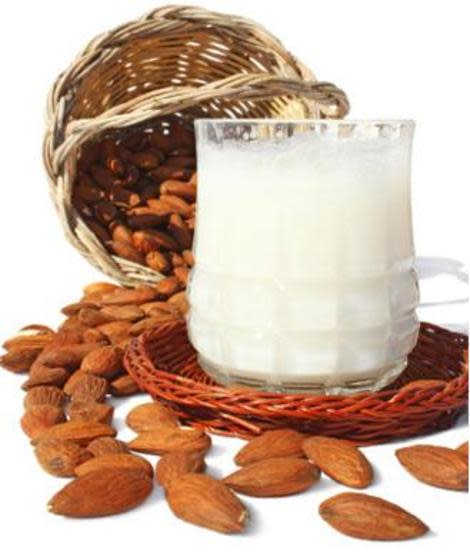3 "Healthy" Foods that Really Aren't
by SHAPE Diet Doc, Mike Roussell, phD.

Eating healthy is a goal many people set and it's certainly a great one. "Healthy" is a surprisingly relative term, however, and many of the believed-to-be-good-for-you foods aren't actually as nutritious as you may think. Here are three that don't merit the "health food" label in my book.
Flavored, Sweetened Milk Alternatives
Non-dairy milks are growing in popularity and oftentimes are seen as a healthier alternative to good 'ol moo juice-but upon closer examination, it is hard to decipher what makes them healthier for the average person. If you have a whey or casein allergy, then milk alternatives are a must-have, and if you are lactose-intolerant then they can be useful. Outside of those situations (which are rarer than most people think), cow's milk is better for you than any flavored almond, soy, coconut, or other dairy-free milk.
With the exception of soy milk, this class of beverages is seriously lacking in the protein department, a place where milk excels. Then there's the fact that additives are needed in order to enhance the flavor, texture, and appeal of these milk alternatives-and unfortunately sugar is one of these major ingredients in addition to fibers, binding agents, and added vitamins and minerals. The levels of additives needed to mimic the flavor, taste, and nutritional profile of milk varies from alternative to alternative, but if you don't have issues with lactose or dairy proteins, then you are probably better off reaching for real milk.
RELATED: Can't have cow's milk due to health problems? Make your own almond milk for an additive-free, low-calorie, refreshing drink.
Egg Whites
Still riding the wave of decade-old science, egg whites became very popular during the low-fat, low-cholesterol craze since they are devoid of both of those and contain just protein. Now, though, the advantages of severely restricting fat due to its high per-gram calorie content as a method of enhancing weight loss has been debunked time and time again. We also know that the amount of cholesterol you eat, doesn't have as much of an impact on your blood cholesterol levels as we once believed.
Deeming a food "healthy" usually means that it is somehow better than a comparative food. The comparative food here, of course, is whole eggs. Saying that egg whites are healthier than whole eggs doesn't seem like a valid statement when you consider the fact that whole eggs contain more protein, vitamin A, vitamin D, vitamin E, choline, and even omega-3 fats (if you buy those kinds of eggs). With all those nutrients packed into the yolk, why would you throw it away?
Whole Grains
The health push behind eating more whole grains should be toned down a couple notches. With all the "good" you hear about whole grains, you'd think that the bran and germ of these foods are going into your artery walls and sucking out oxidized cholesterol and plaques. The problem with the healthy push behind whole grains is that it is relative to what you would have eaten instead.
RELATED: Instead of grains, enjoy some of these low-carb snacks you can eat on the go.
If you are eating puffed rice cereal, potato chips, and Twinkies, then yes you would be better off if you didn't eat those foods and ate whole-grain based foods instead. But you'd probably be even better off is you ditched the potato chips and the whole grains, opting for green vegetables or a palm-sized piece of protein. See, if you are looking to lose weight, adding whole grains to you diet might not even help if you are already cutting calories. A 24-week weight-loss study that pitted a weight-loss diet with whole grains and exercise against a weight-loss diet plus exercise (but not added whole grains) found no difference in the amount of weight lost by each group at the end of the study.
Research shows that if you need to lose some weight and are metabolically flirting with insulin resistance, then your body will respond better to eating less carbs in general. It is better to eat whole grains over refined grains, no arguments here, but it may just be better to leave the grains alone entirely.
It can be hard to separate the hype and buzz from what actually matters to your health and fitness, but hopefully these examples have shown you that just because something can be classified as "healthy" doesn't meant that you have to or should eat it.
More on SHAPE:
16 Savory Oatmeal Recipes
The 10-Minute Arms and Abs Workout
The Truth About Intermittent Fasting
